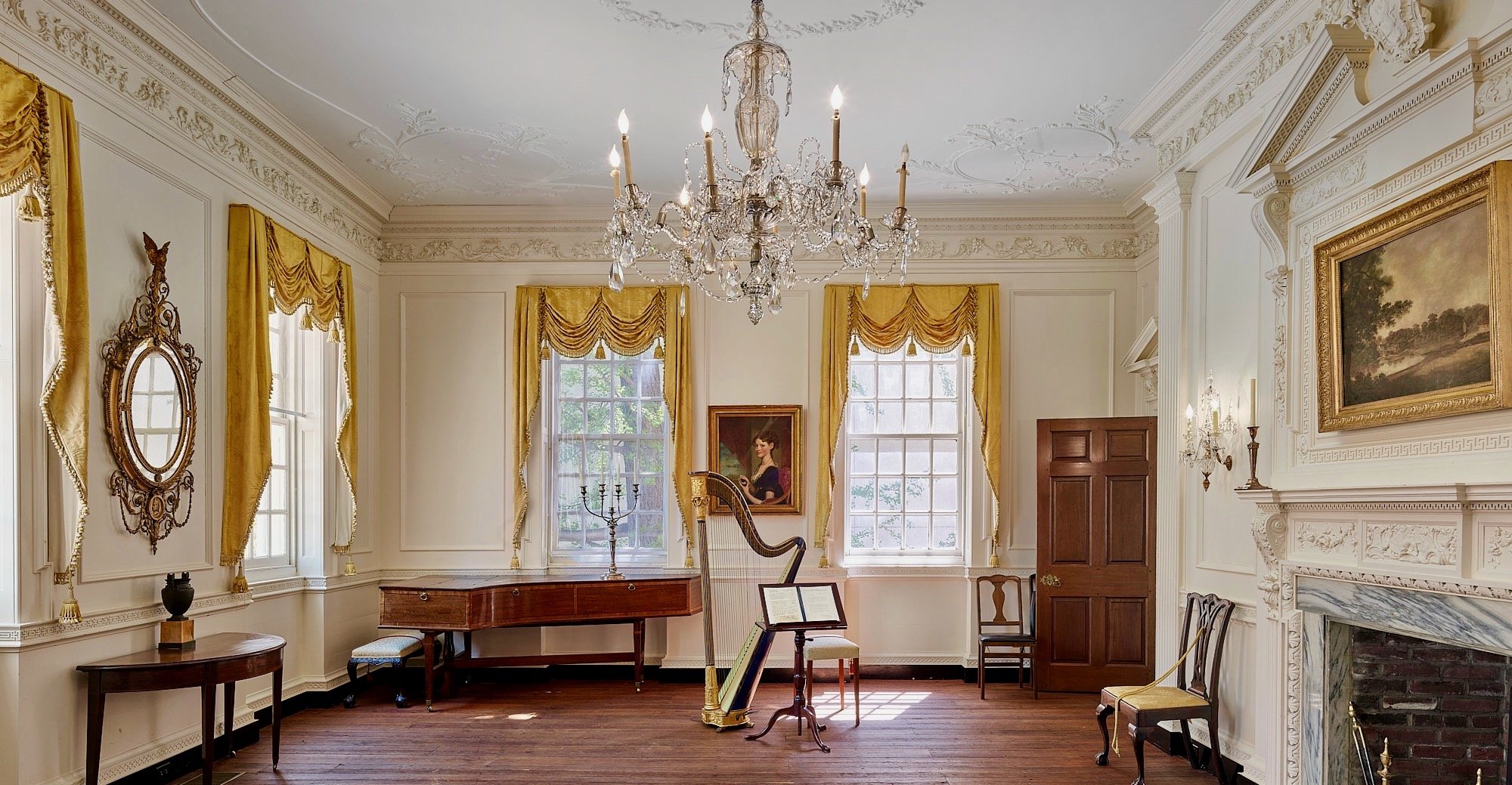
THE POWELS’ SOCIAL CIRCLE.
Lavish Dinner Parties for Political Socialites
Famous visitors to the Powels’ home during the critical years of our country’s formation included, among others, George and Martha Washington, Benjamin Franklin, John and Abigail Adams, and the Marquis de Lafayette.
After one notable dinner at the Powels' in 1774, John Adams wrote in his Diary"... a most sinful feast again! Every Thing which could delight the Eye or allure the Taste...20 sorts of Tarts, fools, Trifles, floating islands, whipped sillabubs etc; etc;..."
Elizabeth was considered the premiere Saloniste of Philadelphia. Throughout the revolution and founding of the United States, it was over evenings at the Powels’ where political discussions flourished.
Elizabeth had grown up in a household were she and her sisters were educated equally along with their brothers and politics was regularly discussed amongst the Willing family’s many prominent dinner guests. So as an adult, Elizabeth was very much at home with these conversations and was deeply involved in the debates at her own gatherings and readily shared her opinions. Her sisters and friends often commented on her outspokenness with both scrutiny and respect.
In 1808, Elizabeth's sister Anne Willing Francis observed, "When in society [Elizabeth] will animate and give a brilliancy to the whole Conversation, [with] the uncommon command she has of Language and [the fact that] her ideas flow with rapidity…I sometimes think her Patriotism causes too much Anxiety. Female politicians are always ridiculed by the other Sex."
In fact, it was Elizabeth Powel herself, likely at one of her dinner parties — and not an anonymous woman as is often reported — who asked Benjamin Franklin the famously often quoted question asked just after the Constitutional Convention ended: “What have we got, a republic or a monarchy?"
To which Franklin replied, "A republic ... if you can keep it."
The Powels’ also hosted many other high-profile friends, family and neighbors: Elizabeth’s brother Thomas Willing, his daughter Anne Willing and husband William Bingham, her sister Margaret and husband Robert Hare, her sister Mary Byrd and her husband William Byrd III of Westover in VA, neighbor Henry Hill, the poet Elizabeth Graeme Fergusson, and Dr. Benjamin Rush.
Notable Dinner Guests at the Powel’s
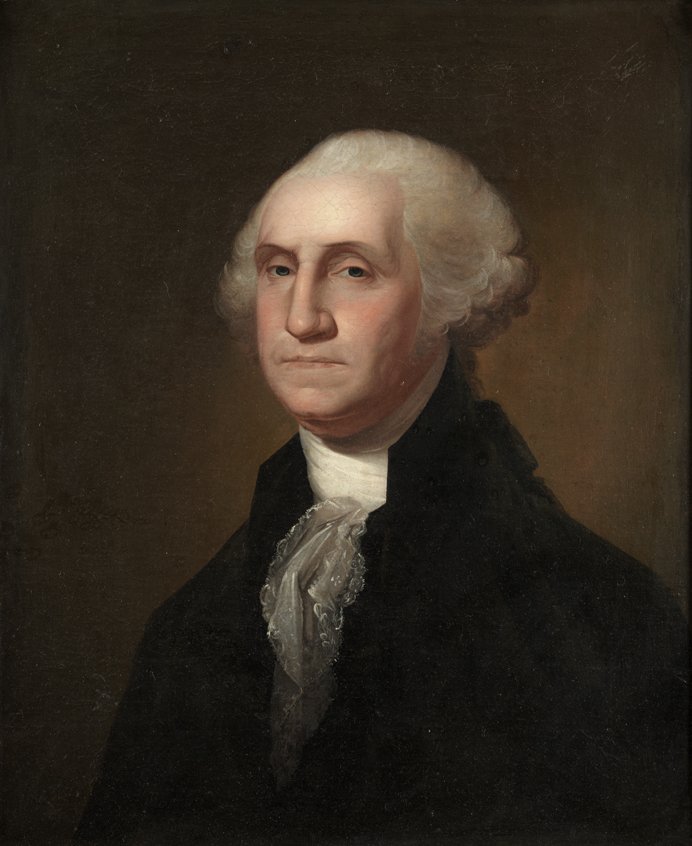
GEORGE WASHINGTON. 1st U.S. President. Commander in Chief in the American Revolution. The top Founding Father. (Portrait by Gilbert Stuart 1803. Clarke Art Institute.)

MARTHA WASHINGTON. George Washington's wife. The nation's inaugural "First Lady.' (Portrait by Unknown artist, 'After Gilbert Stuart' 1800. National Portrait Gallery.)

BENJAMIN FRANKLIN. Founding Father. Signer of Declaration of Independence. Continental Congressman. Inventor. Greatest diplomat in American history. (Portrait by Joseph Duplessis 1778. National Portrait Gallery.)

JOHN ADAMS. 2nd President. 1st Vice President. Founding Father. Continental Congressman. Diplomat. Assisted Jefferson in drafting the Declaration of Independence. (Portrait by Gilbert Stuart, 1821. National Gallery of Art.)

ABIGAIL ADAMS. Wife and closest advisor to John Adams. The mother of John Quincy Adams, our 6th President. (Portrait by Gilbert Stuart 1800. Courtesy National Gallery of Art.)

MARQUIS DE LAFAYETTE. A French aristocrat who was appointed a Major General in the Continental Army. Formed a lasting friendship with General George Washington. (Portrait by Joseph-Désiré Court 1834. Palace of Versailles.)
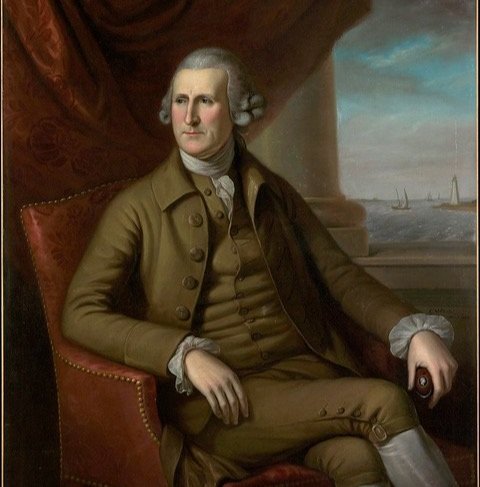
THOMAS WILLING. A 'finance' founding father. Willing, Morris & Co. financed the War. Continental Congressman. President of Bank of N.A. and First Bank of the U.S. (Portrait by Charles Willson Peale 1782. Metropolitan Museum of Art.)
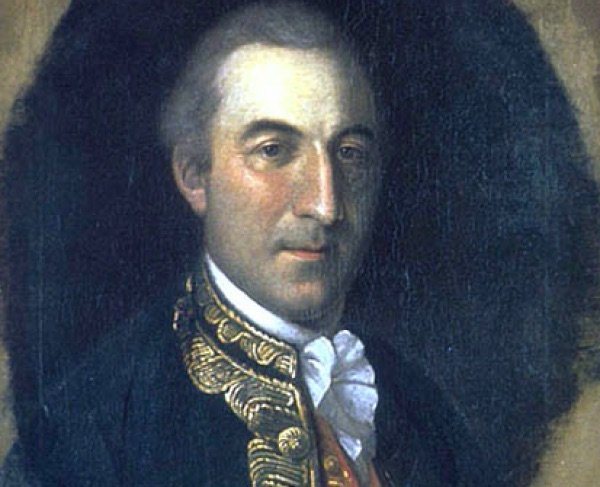
MARQUIS DE CHASTELLUX. A French general who served in the War of Independence. Liaison between Generals Washington and Rochambeau. (Portrait by Charles Willson Peale 1782. Independence National Historical Park.)

SARAH FRANKLIN BACHE. Ben Franklin's daughter. Member of the Ladies Association. Organized the making of 2,200 shirts for Washington's troops. (Portrait by John Hoppner 1793. Metropolitan Museum of Art.)
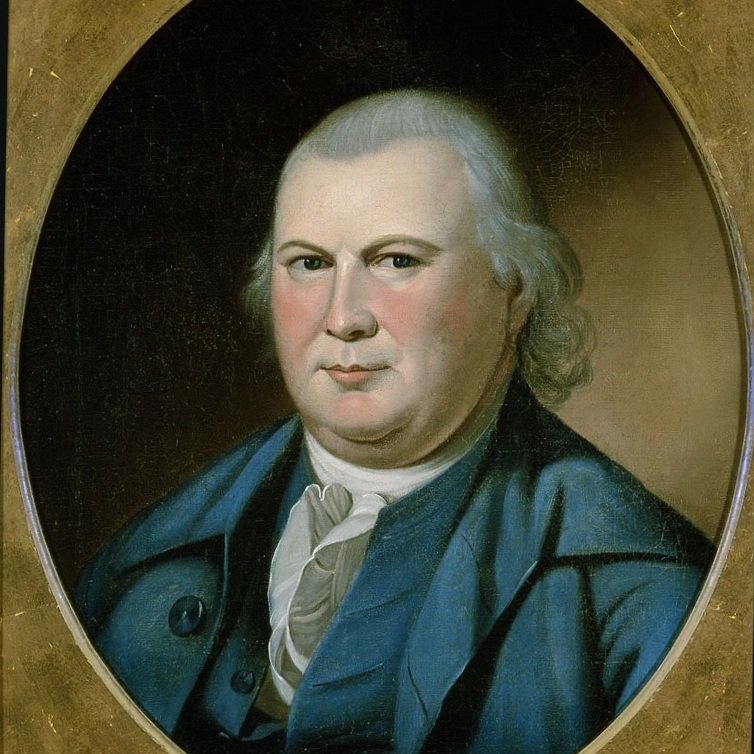
ROBERT MORRIS. Singer of the Declaration of Independence and Constitution. A 'Finance' Founding Father. He and Thomas Willing were the bankers for the American Revolution. (Portrait by Charles Willson Peale 1782. Independence National Historical Park.)

DR. BENJAMIN RUSH. Signer of the Declaration of Independence. Continental Congress and Constitutional Convention member. Professor at the University of PA. A major abolitionist. (Portrait by Charles Willson Peale 1783. Winterthur Museum.)
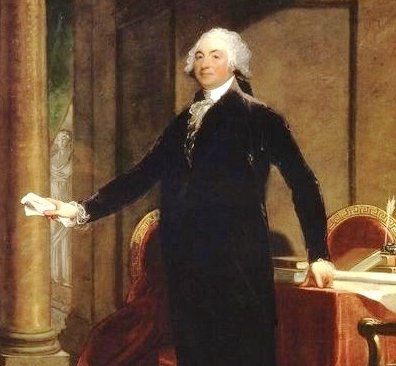
WILLIAM BINGHAM. Member of Continental Congress. Served in the U.S. Senate from 1795 to 1801. One of the wealthiest men in America. Married to Thomas Willing's daughter. (Portrait by Gilbert Stuart 1797. National Portrait Gallery.)
A Friendship Critical to our Nation’s Founding
-

GEORGE WASHINGTON by Gilbert Stuart 1776. Metropolitan Museum of Art
-
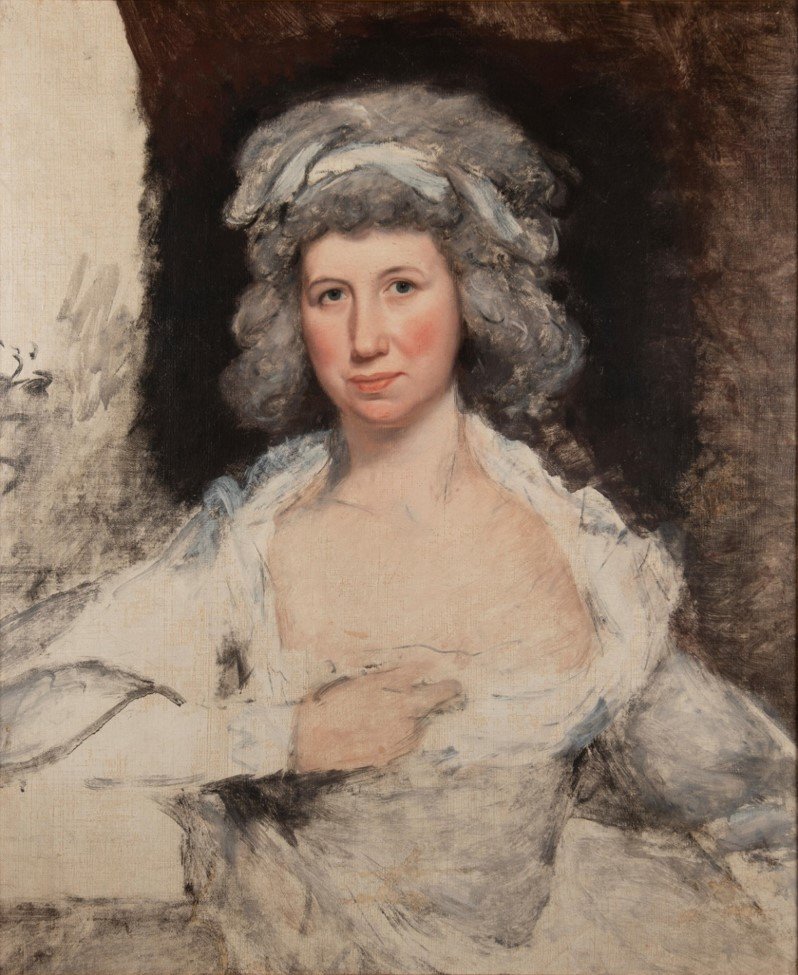
ELIZABETH POWEL by Joseph Wright 1793. Mount Vernon Ladies' Association
Elizabeth Powel, A Founding ‘Mother’
Elizabeth Powel played a seminal role in our nation’s political landscape for more than half a century. The extensive collection of her letters and close relationships with the great men and women of the time make this unambiguously clear. But it was through her friendship with George Washington that she had the most significant impact on American politics and history and in ensuring our young democracy would survive and thrive.
The Historic Friendship Begins. The Washingtons first met the Powels in 1774 during the Continental Congress in Philadelphia. Through dinner parties and other gatherings, the Powels and the Washingtons became social friends. In 1781, when the Washingtons moved next door to the Powels, George and Elizabeth’s relationship strengthened and they became close friends and confidants. They shared political and intellectual ideas over numerous dinners and teas.
Powel’s Seminal Letter to Washington at the End of his First Term. As a result of their close friendship, when Washington was considering stepping down from the presidency after his first term, Powel openly expressed her opinion in an 8-page letter she sent in November 1792 shortly before the election.
Powel considered it “inconsistent with their friendship” to withhold her thoughts. She used every argument she could muster to make her case: from appealing to his patriotism and pointing out the critical imperative to legitimize our democracy to emphasizing the dire consequences for the new government should Washington step down after just one term.
Powel wrote that should Washington leave the office, it “wou’d elate the Enemies of good Government . . . The antifederalists would use it as an argument for dissolving the Union, and would urge that you, from Experience, had found the present System a bad one, and had, artfully withdrawn from it that you might not be crushed under its Ruins."
Powel knew that partisan rhetoric was growing within the political branches, and if the most respected politician in America left office at that time, it would only deepen the divide.
Washington Agreed to Seek a Second Term and Set a Precedent. Washington took Powel’s advice seriously and ultimately agreed to serve a second term. Historians of Washington and the founding era, believe that Powel’s extraordinary letter may have been, as historian Ron Chernow wrote, the "decisive stroke" in convincing Washington to seek a second term.
As the only woman, and only member outside of the Washington cabinet to comment on this subject, we can infer the strength of Elizabeth Powel’s words changed the course of history.
For more information on the November 1792 letter, see Samantha Snyder’s article, The Influencer published in the Fall 2020 Mount Vernon Magazine.
Chernow, Ron (2011). Washington: A Life. Penguin. ISBN 978-0-14-311996-8. Archived. Retrieved August 22, 2020.
Samuel Powel & City Tavern
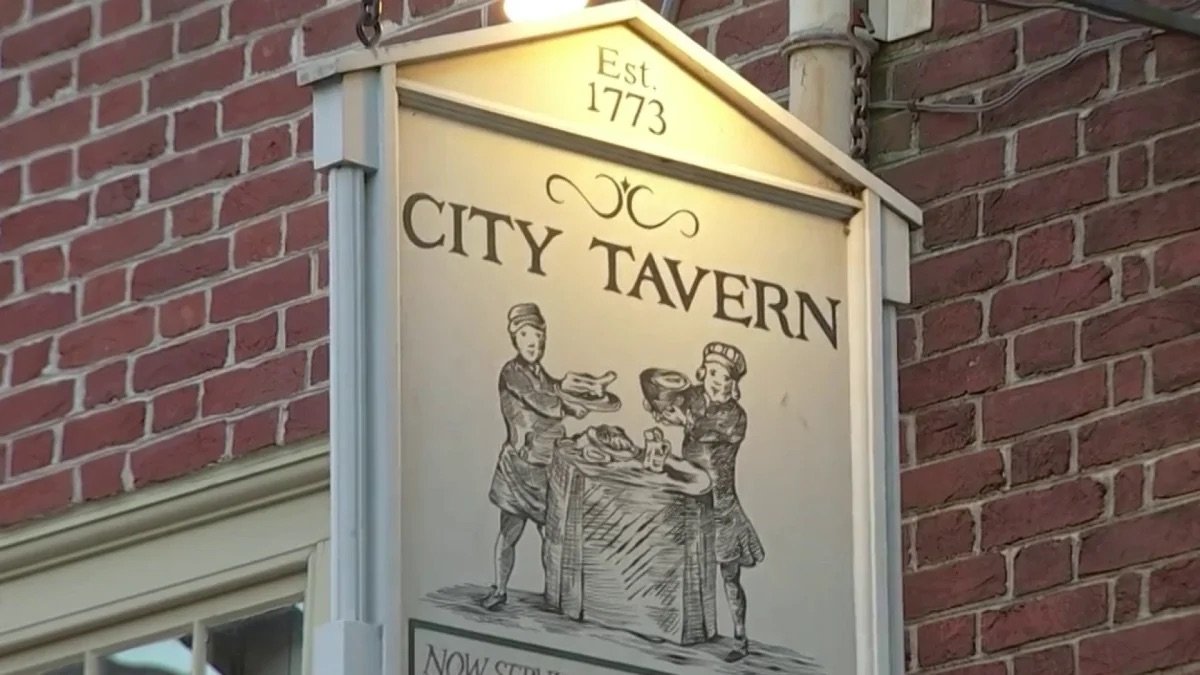
Courtesy City Tavern Restaurant.
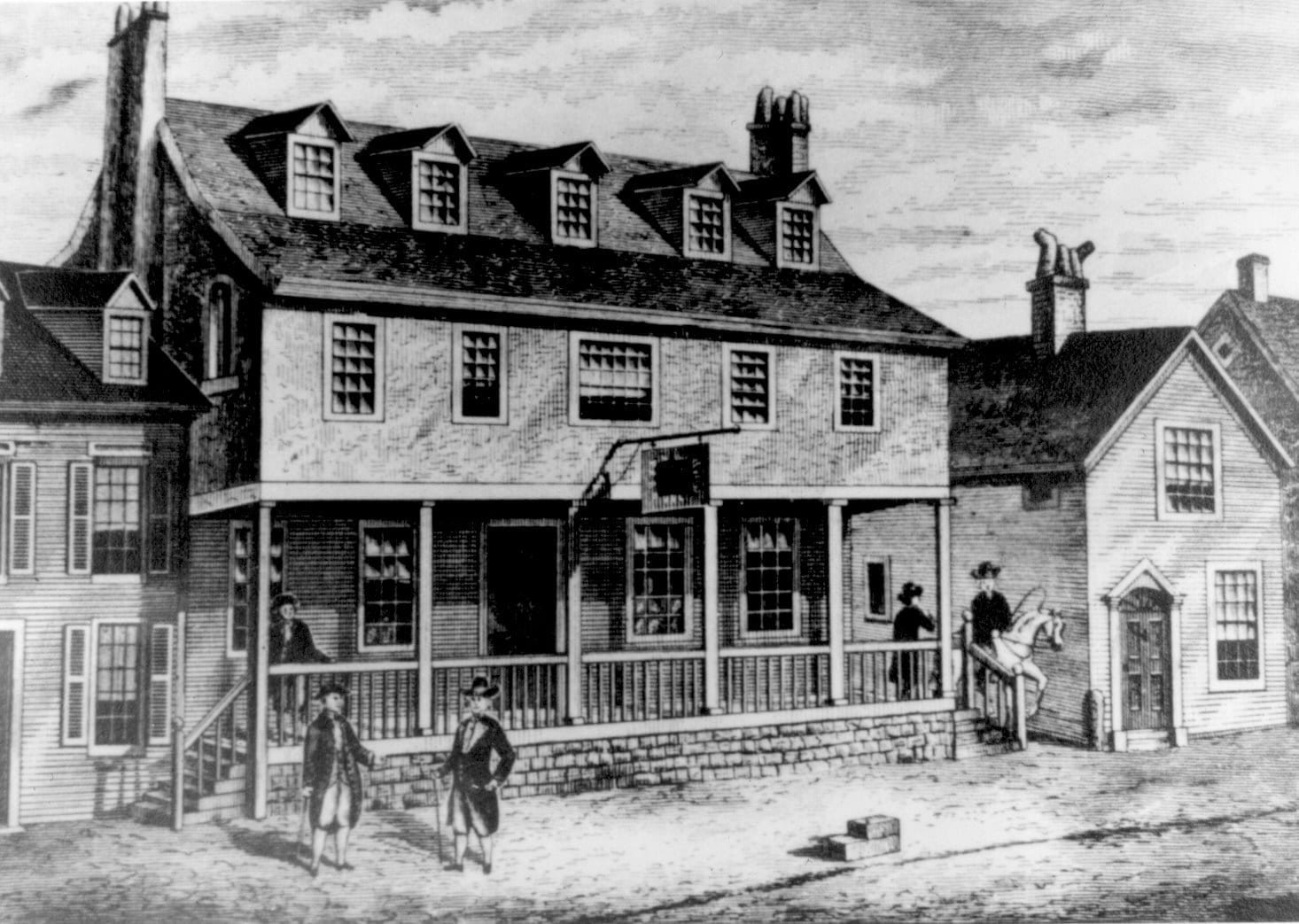
An etching of the original City Tavern at 2nd and Walnut, 1910.
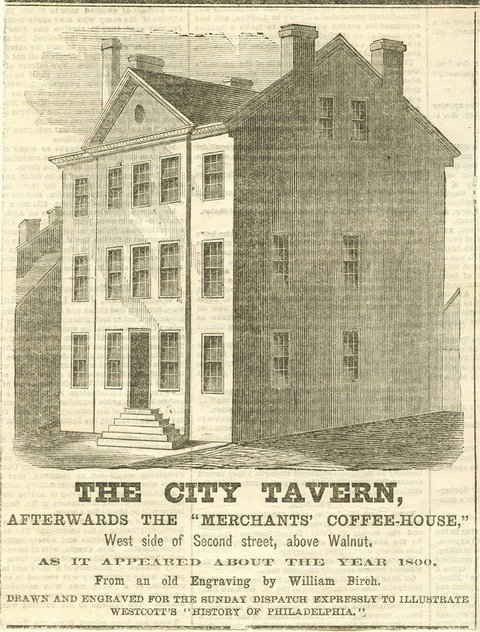
Illustration of City Tavern. William Russell Birch engraver.
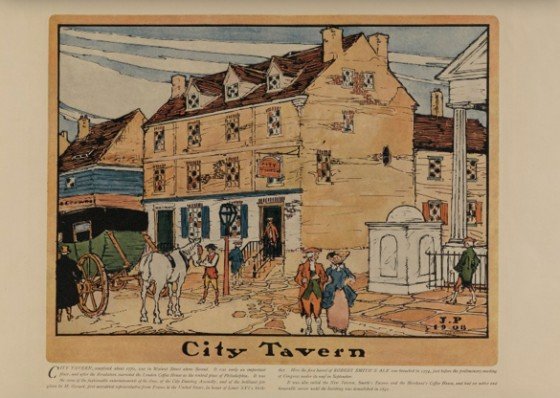
James Moore Preston. “City Tavern.” From a set of twelve prints of Philadelphia taverns.
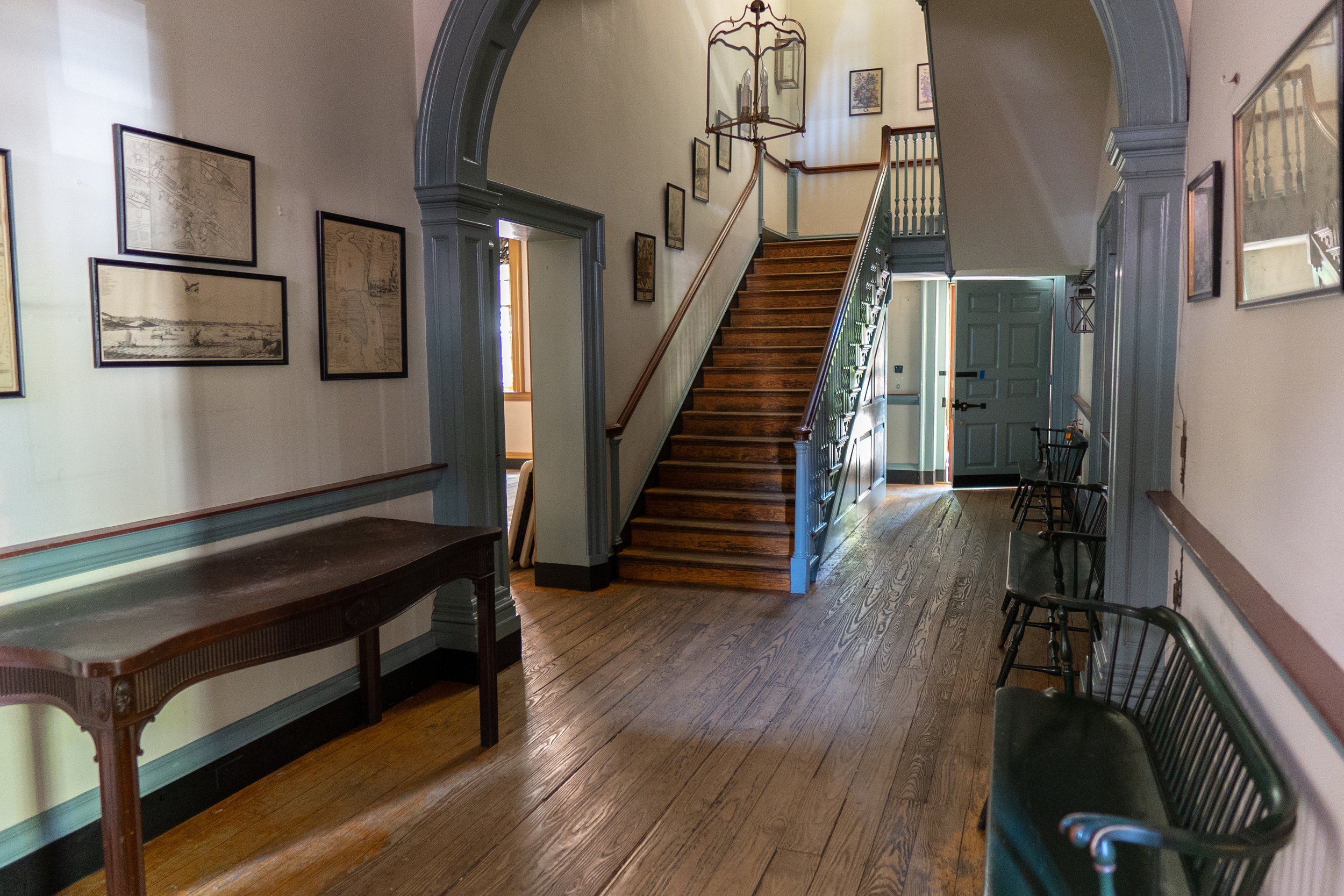
City Tavern Stairhall. Copyright National Park Service.
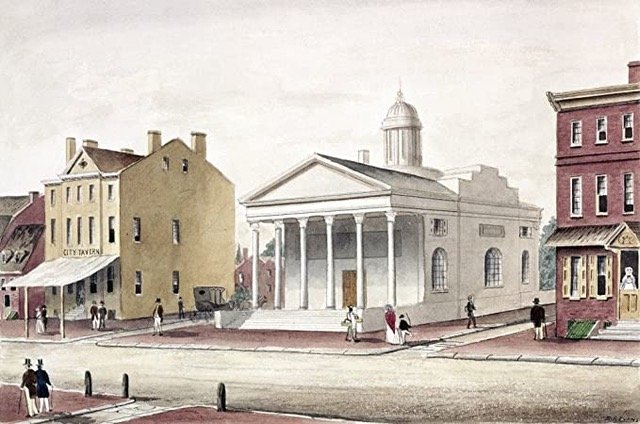
City Tavern & Bank of PA. Watercolor By R Evans, 1835. From line engraving, 1800, by William Birch & Son. Philahistory.org
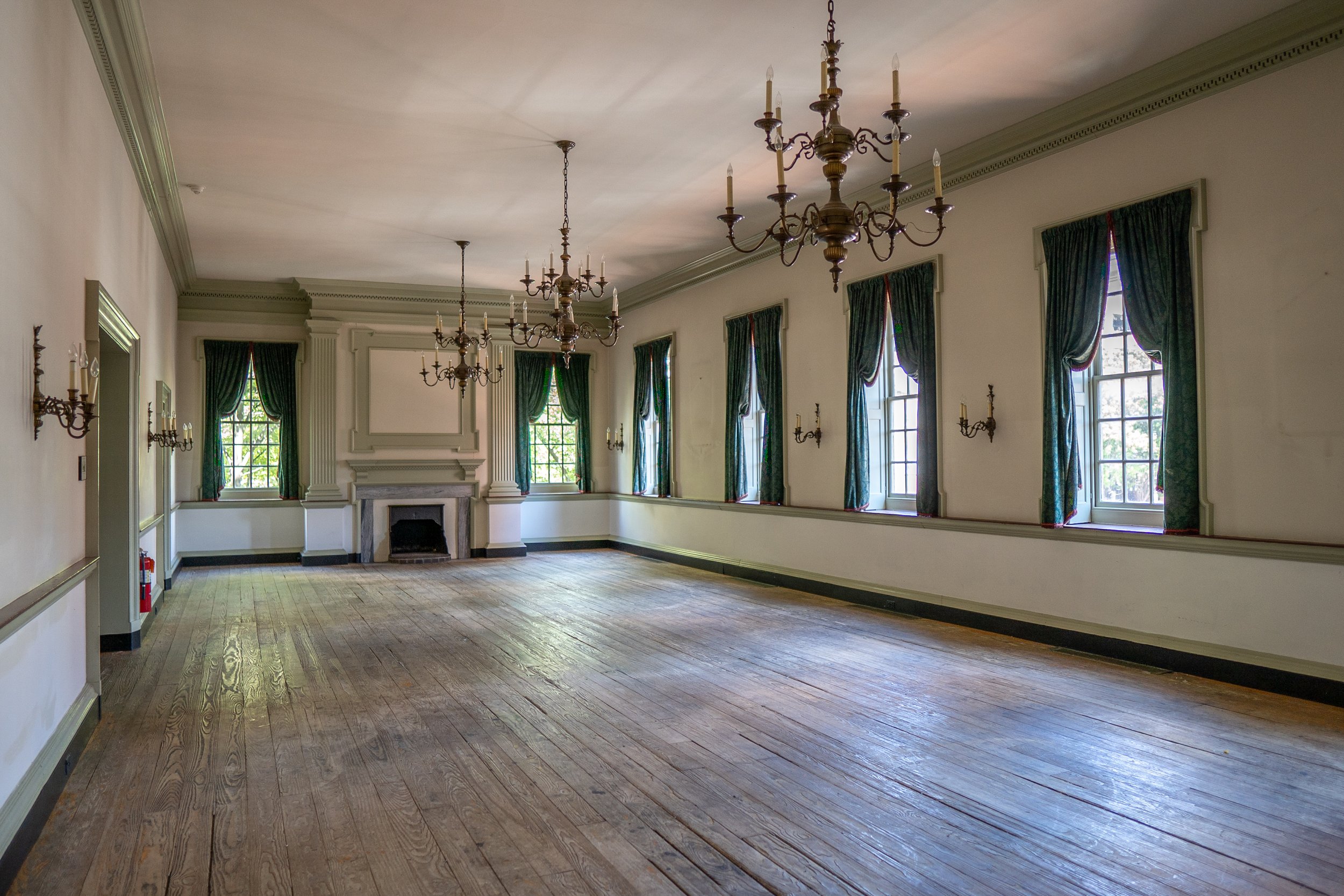
City Tavern Long Room / Ballroom whereBanquets and Dancing parties were held. Copyright National Park Service.
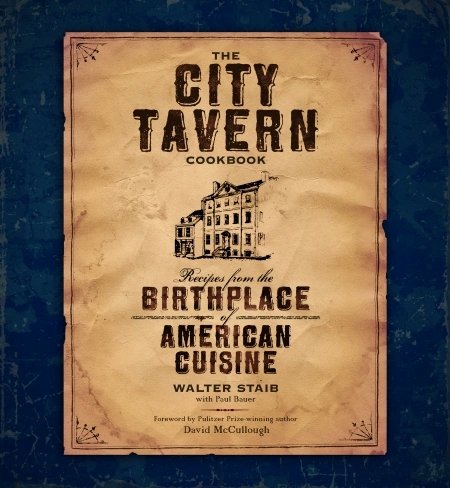
Publisher Running Press. Copyright Hatchett Book Group.

Courtesy City Tavern Restaurant.
Historic City Tavern traces its origins to 1772. A group of 53 wealthy Philadelphia men sought to create a place where the elite could dine, socialize and debate, and visitors could lodge.
Their plan was to lease the land on Second Street near Walnut, owned by their friend Samuel Powel, and then build a new tavern. The Powel family had owned that land since 1705. Powel, in fact, owned the entire block — bordered by Second, Walnut and Dock. And he was already working on developing the property with his master builder.
Powel’s interests coincided with his friends and family who included Powel’s brother-in-law Thomas Willing, his wife Elizabeth’s cousin Joseph Shippen, Jr., his friends Governor John Penn, Joseph Reed, John Cadwalader and Henry Hill, along with Hill’s two brother-in-laws George Clymer and Samuel Meredith.
A Tavern for the Elite. Like Powel, they too saw the merits of this prime location: near the city center on one of its principal streets with its elegant shops and markets. The group’s aim was to construct a multi-use tavern for more refined entertainment and conversation. And far enough removed from the waterfront to be away from the noise and bad behavior of “the lower sort.”
The group sold shares and created a Trust, similar to how the elite had structured other social institutions, including Philadelphia’s Dancing Assembly and The Schuylkill River Fishing Club. The Trust then elected seven top tier trustees to raise the funds for construction and choose the design. Among these seven principles were Samuel Powel and Henry Hill.
They hired Samuel Powel’s builder Thomas Procter to construct the new tavern on a far grander scale than other local taverns to reflect their status and to promote their beloved city to visitors. Philadelphia was now the second largest city in the colonies, with an excellent harbor, fine houses, paver stone streets, brick sidewalks and publicly supported street lighting.
Philadelphia’s Political Hub. City Tavern became the gathering place for discussion and debate. It was also a key hub for entertaining, dancing, dining, drinking, and playing cards and games. And Powel benefited substantially during this busy era, earning a sizable annual rent.
It was to City Tavern that Paul Revere rode his horse to in 1774 from Boston to make the dramatic announcement of the British blockade of the Boston port. Nearly 300 citizens crowded into the Tavern’s second floor ‘Long Room’ to hear the news, after which prominent city leaders resolved to convene the First Continental Congress and select a Committee of Correspondence tasked with communicating regularly with the colonies and coordinating resistance.
John Adams called the Tavern “the most genteel one in America” and in a 1774 letter, describes a party he attended that was hosted by the Pennsylvania Assembly for the “Gentlemen of Congress.”
Thomas Jefferson ate all his meals at City Tavern during the writing of the Declaration of Independence.
Both the First and Second Continental Congresses used the Tavern extensively as their informal gathering place.
General Washington made the tavern his official headquarters in August 1777, meeting regularly with his new young friend, the Marquis de Layfayette, just before the British entered Philadelphia later that year.
The British Occupation. In September of 1777, the British marched into Philadelphia and began an eight month occupation of the city. During this period, they took over City Tavern for their own use. Here, British soldiers entertained and danced with the daughters of Tory families. They also used some rooms in the five story City Tavern to periodically house prisoners of war.
After the British left Philadelphia for New York in 1778, the Tavern’s subscribers fired the Tavern’s manager Daniel Smith who they discovered had been a Tory sympathizer.
Samuel Powel Takes Over as Sole Owner. The group of original owners continued to operate the Tavern for the next several years until 1785 when they sold the Tavern for £ 3,000 to Samuel Powel, who now owned both the land and the Tavern and its outbuildings.
Powel took over management and hired Edward Moyston to run the operation. Powel also purchased the adjacent Three Crowns Tavern, so that ladies would have their own gathering place and be able to access accommodations.
The Venue for Key Historic Celebrations. Over the years, City Tavern hosted many notable celebrations, including the victory party in General Anthony Wayne’s honor after his victory at the Battle of Fallen Timbers (1794), which secured westward expansion for the United States.
In earlier years, celebrations at City Tavern included the banquet Congress held to send off General Washington before he departed for Boston to lead the Continental Army.
On July 4, 1777, three months before Congress fled to York, PA, City Tavern hosted America’s first Fourth of July celebration, which included a 13-gun salute, a parade, fireworks and a grand banquet at the City Tavern for the city’s leading citizens.
At the end of the Constitutional Convention in 1787, City Tavern was again the venue selected for the celebration. 56 guests gathered in the ‘Long Room’ and proceeded to consume 50 bottles of Henry Hill’s Madeira, 60 bottles of Claret, 8 bottles of old stock, 22 bottles of Robert Hare’s Porter, 8 bottles of cider, 12 bottles of beer and 7 large bowls of punch.
In 1789, 250 guests attended a pre-inauguration banquet in the Long Room for George Washington before he departed for New York City to be sworn in as the first President complete with band music and fireworks.
City Tavern also had played host for the founding of the State Society of the Cincinnati of Pennsylvania in October 1783.
New Owner Elizabeth Powel Proves Her Business Savvy. When Samuel Powel died of Yellow Fever in 1793, Elizabeth Powel inherited City Tavern and all her husband’s properties. Seeing the attractive return the property generated, Elizabeth immediately began to make improvements to take full advantage of the federal government’s new presence in Philadelphia as the nation’s capital.
Among Elizabeth’s improvements were adding larger dormer windows to the upstairs guest bedrooms, to bring in more light and air, re-shingling the roof and adding new copper valleys and flashing, digging a new well, building a new hen coop, and enhancing the other out-buildings. Elizabeth then wisely reinsured her now larger and improved property.
Return to POWEL HOUSE home page.
